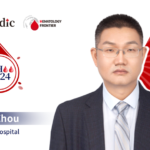
Editor’s Note: From December 7–10, 2024, the 66th Annual Meeting of the American Society of Hematology (ASH) was held in San Diego, USA, bringing together global experts and scholars in hematology to discuss the latest research developments. At this year’s conference, Dr. Qingqing Cai’s team from Sun Yat-sen University Cancer Center presented two research posters (P3047, P4450), offering novel perspectives and important insights into immunotherapy combinations for relapsed/refractory lymphoma. Hematology Frontier invited Dr. Cai to share the clinical significance and key findings of her team’s research.Hematology Frontier: In your P4450 study, you explored the use of liposomal mitoxantrone combined with tislelizumab for treating relapsed/refractory NK/T-cell lymphoma (NKTCL). What were the key considerations for this combination, and what impact could it have on treatment?
Dr. Qingqing Cai: Relapsed/refractory (R/R) NKTCL patients face poor survival outcomes. For those who relapse after initial non-anthracycline regimens, the median overall survival (OS) is only six months. Liposomal mitoxantrone (Lipo-MIT), a nanodrug approved as a first-line treatment for R/R peripheral T-cell lymphoma (PTCL), has demonstrated efficacy and safety in a pivotal Phase II study. Tislelizumab, a humanized anti-PD-1 monoclonal antibody, has shown progress in treating R/R NKTCL, though the complete response (CR) rate with monotherapy remains limited. Data suggest that Lipo-MIT monotherapy achieves an objective response rate (ORR) of 40.7% in R/R NKTCL, while tislelizumab monotherapy achieves an ORR of 31.8%. We believed that combining PD-1 inhibitors with Lipo-MIT held potential worth exploring.
Based on this rationale, we designed an Ib/II study combining tislelizumab and Lipo-MIT to enhance efficacy while maintaining safety and tolerability. Preliminary results from 27 evaluable patients showed an ORR of 77.8%, with controllable safety. The data so far are promising, and we plan to continue monitoring long-term survival outcomes. We hope this combination will eventually offer an effective treatment option for R/R NKTCL patients.
Hematology Frontier: Your P3047 study focused on the combination of TQB2223 (a LAG-3 monoclonal antibody) and penpulimab (a PD-1 inhibitor) for relapsed/refractory lymphoma. What are the advantages of this combination over monotherapy, and what were the key findings?
Dr. Qingqing Cai: TQB2223 is a novel LAG-3 monoclonal antibody, while penpulimab is a PD-1 inhibitor. LAG-3 and PD-1 are critical immune checkpoints that synergistically suppress T-cell activity in the tumor microenvironment, leading to immune evasion. Dual checkpoint blockade with PD-1 and LAG-3 has shown antitumor activity in advanced melanoma patients.
Our Phase I trial aimed to assess the safety and efficacy of combining TQB2223 and penpulimab in advanced tumors. Among 21 patients, including Hodgkin lymphoma (HL) and other lymphoma subtypes, the ORR was 52.38%, and the disease control rate (DCR) was 80.95%. For HL patients who had previously undergone anti-PD-1/L1 therapy, the ORR was 50%, and the DCR was 83.33%. Safety results were encouraging, with most treatment-related adverse events (TEAEs) being mild (Grade 1–2).
The findings suggest that the TQB2223-penpulimab combination is a promising dual checkpoint blockade therapy, particularly for patients with HL who have failed multiple prior treatments. Future studies will further evaluate this combination across different lymphoma subtypes.
Hematology Frontier: Both of your studies addressed immunotherapy combinations for relapsed/refractory lymphoma. What challenges do you foresee in implementing such therapies in clinical practice, and what future directions do you envision for lymphoma immunotherapy?
Dr. Qingqing Cai: Implementing new immunotherapy combinations poses several challenges:
- Patient Heterogeneity: The complex immune microenvironment of R/R lymphoma patients makes predicting treatment efficacy and patient selection difficult. Different lymphoma subtypes respond variably to immunotherapy. Additionally, the efficacy of reinitiating immunotherapy after frontline PD-1 inhibitor failure requires further investigation.
- Management of Adverse Events: Combined immunotherapy, especially dual checkpoint blockade, can lead to compounded immune-related adverse events (irAEs), requiring close monitoring and management.
Looking ahead, lymphoma immunotherapy could focus on:
- Development of New Targets: Exploring immune checkpoints like LAG-3, SIRPα, and TIGIT, as well as molecular targets, to enhance efficacy through multi-target combination therapies.
- Advancing Personalized Therapies: Using genomic or single-cell transcriptomic sequencing to analyze tumor immune microenvironments and molecular characteristics, enabling precise treatment strategies.
- Regulating the Tumor Microenvironment: Combining immunotherapy with metabolic regulation or targeted therapies to enhance antitumor immune responses.
About the Expert
Dr. Qingqing Cai
Dr. Qingqing Cai is a professor, chief physician, and doctoral supervisor at Sun Yat-sen University Cancer Center, where she serves as Deputy Director of the Department of Internal Medicine. She is a distinguished professor under the Ministry of Education’s Changjiang Scholars Program.
Dr. Cai holds leadership roles in numerous organizations, including:
- Chair, Chinese Anti-Cancer Association’s Committee on Integrated Chinese-Western Medicine for Lymphoma
- Chair, Guangdong Anti-Cancer Association’s Lymphoma Committee
- Chair, Guangdong Medical Association’s Lymphoma Group
- Chair, Guangdong Precision Medicine Association’s Lymphoma Committee
Over the past five years, Dr. Cai has published more than 20 SCI papers as a corresponding author in prestigious journals such as Lancet Haematology, Blood, and Leukemia. She has received multiple honors, including the 2023 Guangdong Provincial Science and Technology Progress Award (First Prize). Her research focuses on advancing lymphoma therapies and improving patient outcomes.


